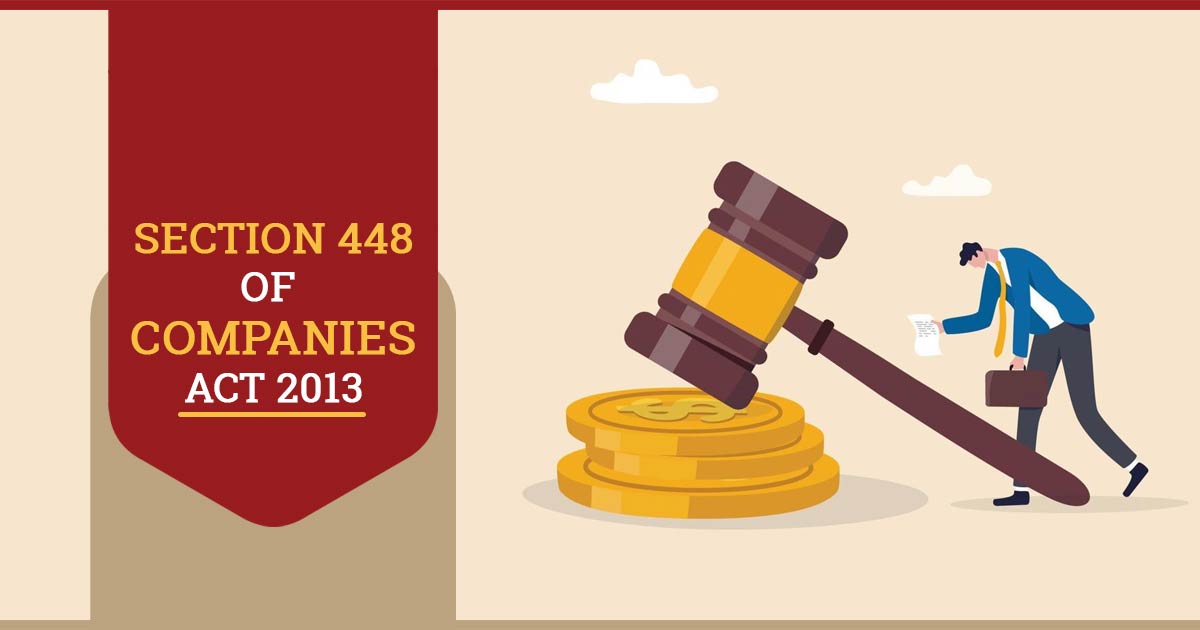
Analysis of Section 448 Punishment for False Statement under Companies Act 2013
What is Section 448 of the Companies Act 2013?
False statements that are made intentionally and purposefully about any firm, its records, or its activities are treated seriously in India as criminal offences. According to Section 448 of the Companies Act, 2013 this offence carries penalties.
The purpose of this Act is to guarantee that businesses and organizations run efficiently and legally. This article will examine Section 448 of the Companies Act, 2013, which addresses the penalties for making bogus statements.
According to Section 448 of the Companies Act of 2013, anyone who obtains a loan, reward, or benefit of any kind from a company, company officer, representative, or other person using a false statement or document—or who gives another person a false appearance of title or obligation—shall be subject to punishment.
The severity of the crime committed will determine the appropriate penalty for this offence. A fine, a term of simple imprisonment, or both, may be imposed. Depending on the kind and severity of the offence, the offender can even be subject to additional penalties in specific circumstances.
To safeguard the interests of owners, creditors, and other interested parties in corporations, Section 448 was created. Also, the part serves as a deterrent to any malicious conduct committed using fake claims or papers. The severe punishment stipulated in this section makes sure that those who commit this crime are apprehended and made to answer for their deeds.
Read Also: Section 338 of Companies Act: Purpose, Analysis & Penalty
Understanding False Statements or Documents
Understanding what constitutes a false statement or document is crucial to comprehending Section 448’s full implications. A false statement or document is one that omits important information that should be revealed in the context or contains inaccurate or untrue information.
Moreover, the context itself may make assertions or documents that are untrue. Similar to this, activities that provide the person or organization to whom the statement or document has been delivered a false impression of title or obligation are referred to as a false appearance of title or obligation.
Since the violation of Section 448 is a crime, it is crucial that the false statement or document was made intentionally and knowingly. In other words, if the false statement or document was created accidentally or without knowledge, the person cannot be held accountable for this crime.
Penalty Under Section 448
According to section 447 of the Companies Act, 2013, if any person is found guilty of fraud then he/she is liable for:
- Imprisonment for a maximum of 5 years or a fine which may extend to Rs. 50 Lakhs or both-If the amount involved in fraud is less than Rs. 10 Lakh or 1% of the turnover of the company, whichever is lower, and does not involve public interest.
- Imprisonment for a minimum of 6 months and a maximum of 10 years along with a fine which shall not be less than the amount involved in the fraud, but which may extend to three times the amount involved in the fraud- If the amount involved in fraud is more than Rs. 10 Lakh or 1% of the turnover of the company, whichever is lower. Further, if the fraud is subject to public interest then the imprisonment term shall be a minimum 3 years.
Requirements Under Section 448
To correctly comprehend and apply Section 448 requirements, it is critical for all stakeholders, including corporations, their officers, representatives, and other individuals, to perform due diligence at all times. Moreover, businesses should guarantee that all papers and assertions they provide are correct and genuine. Similarly, customers must be aware of their due diligence obligations and take the required safeguards before investing in businesses.
It is also worth noting that Section 448 only pertains to the corporate sector and has no bearing on the non-corporate sector. As a result, it is essential to be cautious when dealing with corporations and to be aware of the potential consequences of misleading assertions.
Finally, Section 448 of the Companies Act of 2013 imposes a clear and strong punishment on individuals who make fraudulent declarations or papers. As previously stated, this is a criminal offence that can result in fines, imprisonment, or both for the culprit.
As a result, it is critical for everyone involved in a company’s business to undertake due diligence and verify that all records and claims are true and truthful. This will assist to safeguard all parties from deceptive or fraudulent acts and guarantee that justice is delivered.









